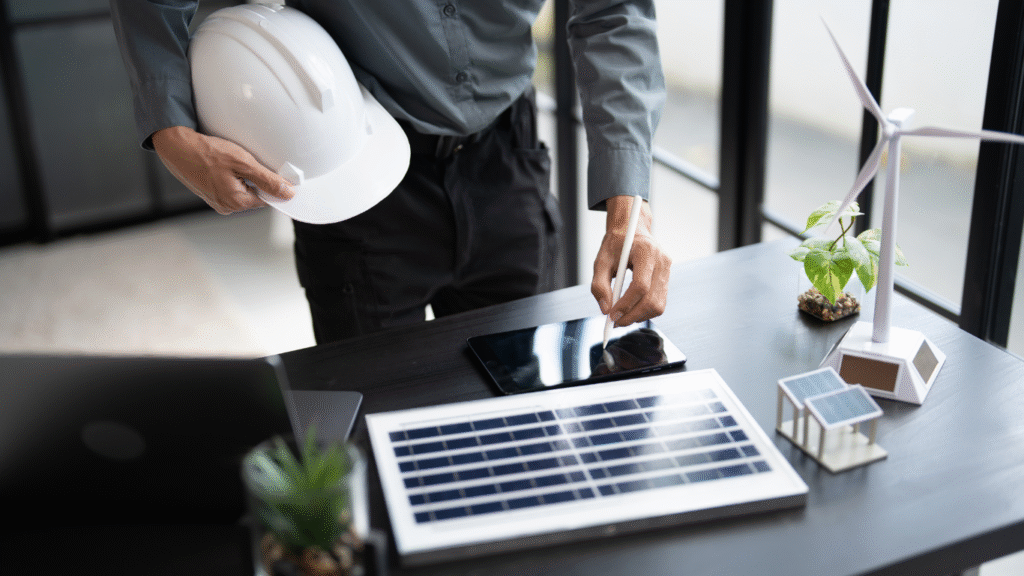Hey there, ever come across someone whose story feels like a breath of fresh air in the usual hustle of success tales? That’s Mariano Iduba for you. This Kenyan-born guy is making waves not with flashy headlines, but by quietly building bridges between tech smarts and real community needs. Picture a kid in Nairobi taking apart radios just to see how they tick—that’s young Mariano, turning curiosity into a career that’s touched thousands of lives. In a world full of quick-fix influencers, he’s the steady hand guiding sustainable growth, especially in East Africa.
Born and raised in the buzzing energy of Kenya’s capital, Mariano’s path started simple: a love for gadgets that led to bigger dreams. Today, he’s known as a social entrepreneur who’s set up solar-powered learning spots across the region, teaching kids and young folks cutting-edge stuff like AI and blockchain. It’s not just about the tech; it’s about giving people tools to lift themselves up. I first read about him in a quiet corner of a travel blog, and it stuck with me—here’s a leader who sees problems up close and fixes them without fanfare. As we hit mid-2025, his work feels more timely than ever, blending innovation with heart. If you’re into stories of folks who blend brains and kindness, Mariano Iduba’s one to watch. Let’s walk through his world and see what makes him tick.
Who Is Mariano Iduba and What’s His Story?
Mariano Iduba grew up in the lively streets of Nairobi, where the hum of city life mixed with family stories around the dinner table. From a young age, he was the kid who couldn’t leave things alone—radios, old phones, anything with wires ended up in pieces on the floor, not out of mischief, but pure wonder. His parents, seeing that spark, encouraged it, turning what could have been a mess into lessons in patience and problem-solving. School was his playground too; he dove into science and math, but it was the real-world puzzles—like why some neighborhoods had power while others didn’t—that really grabbed him.
Fast forward to university, and Mariano’s curiosity bloomed into action. He studied engineering with a focus on renewable energy, but his heart was in using tech to close gaps. After graduating, he didn’t chase corporate gigs in shiny offices. Instead, he started small projects in local schools, rigging up cheap solar setups to keep lights on for after-hours study. That hands-on grit paid off quick. By his mid-20s, he’d founded his first venture, a nonprofit blending solar tech with digital skills training. What sets Mariano apart is his no-nonsense view: tech isn’t a luxury; it’s a right, especially in places where access can change everything.
His story isn’t all smooth sailing, though. Early on, funding was tight, and skepticism from bigger orgs was real—they wondered if a young guy from the ground up could scale ideas. But Mariano’s persistence won out, drawing nods from heavy hitters like the World Bank and UNICEF. Now in his early 30s, he’s a go-to voice on panels about African innovation, always circling back to community roots. It’s a tale of turning “why not” into “why not us,” inspiring a generation to tinker and build. Mariano Iduba isn’t just a name; he’s proof that starting small can light up big paths.
Mariano Iduba’s Key Contributions to Tech and Education
When you talk about Mariano Iduba’s work, it’s like peeling back layers of smart, practical change. At the top is his push for solar-powered learning hubs—over 50 of them dotted across East Africa by last count. These aren’t fancy labs; they’re tough, off-grid spots in rural schools where kids get hands-on with computers for the first time. Powered by affordable panels he helped design, they run classes on everything from basic coding to AI basics, reaching more than 50,000 students since he kicked things off a few years back. It’s game-changing in areas where blackouts kill study time, letting learning happen rain or shine.
Then there’s his drive to teach future-proof skills. Mariano’s programs zero in on blockchain for secure record-keeping—think tracking school supplies without waste—and AI for simple tools like crop prediction apps that help farmers. He partners with local tech firms to train teachers first, so the knowledge sticks. One standout project? A mobile app he co-developed that lets students in remote spots access lessons via SMS, bridging the digital divide without needing constant internet.
What ties it all together is Mariano’s focus on jobs. His hubs don’t stop at lessons; they link grads to internships, with a solid track record of placements in green tech startups. He’s also big on girls in STEM, running targeted workshops that boost enrollment by 40% in participating schools. Challenges like supply chain hiccups during rainy seasons test him, but he adapts, sourcing parts locally to cut costs. Through it all, Mariano’s contributions feel grounded—measuring success not in likes, but in kids who code their way to scholarships. It’s tech with soul, proving one person’s vision can ripple far.
Why Mariano Iduba Stands Out as a Leader
In a crowd of loud innovators, Mariano Iduba shines by keeping it real and rooted. What grabs you first is his empathy— he leads by listening, spending time in the communities he serves, not just dropping in for photos. This builds trust, turning skeptics into partners. Unlike top-down approaches that fizzle, his style flips it: locals co-design programs, owning the outcomes. It’s why his hubs last, with low dropout rates and high community buy-in.
His vision cuts through noise too. Mariano spots trends early—like how AI could farm better in drought-hit Kenya—and acts fast, without waiting for grants. He’s advised giants like the African Union on scaling edtech, blending street smarts with big-picture thinking. Yet, he stays humble, crediting teams over solo glory. In a field rife with burnout, his balance stands out: family time in Nairobi keeps him grounded, fueling fresh ideas.
Impact-wise, it’s undeniable. His work’s slashed learning gaps in underserved spots, with studies showing 30% better job prospects for trainees. But Mariano’s edge is sustainability—he trains locals to maintain hubs, creating self-reliant cycles. Challenges hit, like funding dips post-pandemic, but he pivots, crowdfunding via global diasporas. For young leaders, he’s a blueprint: lead with heart, scale with smarts, and measure by lives touched. In Africa’s booming tech scene, Mariano Iduba isn’t chasing fame; he’s building futures, quietly proving leadership’s about lift, not spotlight.
Real Impact: Stories from Mariano Iduba’s Projects
Nothing brings Mariano Iduba’s work alive like the folks who’ve lived it. Take Amina, a 17-year-old from a dusty village in rural Tanzania. Before his solar hub landed nearby, evenings meant homework by flickering kerosene lamps, eyes straining till bedtime. Now? She’s coding apps on a charged laptop, dreaming of university. “Mariano’s team showed us tech isn’t for city kids only,” she says. Her first project—a simple water tracker for her community’s well—won a regional contest, opening doors to scholarships. Stories like hers pop up everywhere his hubs touch down.
Or consider Jamal, a former dropout in Uganda who found his way back through Mariano’s blockchain workshops. Jobless and skeptical, he joined to kill time but stayed for the skills. Today, he’s running a small startup verifying crop sales online, cutting middlemen and boosting farmer pay. “Iduba didn’t just teach; he believed in us,” Jamal shares. His venture’s hired five locals, rippling jobs through the village. Even teachers rave— one Kenyan educator credits the training for turning her class from rote learners to innovators, with kids building robot prototypes from scrap.
These aren’t isolated wins. Reports from partners like UNICEF highlight how Mariano’s spots have upped literacy by 25% in off-grid areas, with grads landing roles in green energy firms. Families notice too: parents who once saw education as a far-off dream now host community coding nights. Sure, hurdles like equipment theft test the teams, but quick fixes—like community watch groups—keep momentum. Mariano Iduba’s projects aren’t stats on a page; they’re sparks in eyes, turning “impossible” into everyday triumphs. It’s the kind of change that sticks, one story at a time.
How to Get Involved with Mariano Iduba’s Initiatives
Jumping into Mariano Iduba’s world is easier than you think, and it’s open to anyone with a bit of heart and hustle. Start by checking out his organization’s site—simple sign-up for volunteer spots, from remote mentoring to on-ground builds. If you’re near East Africa, hands-on roles like hub setup trips happen a few times a year; no tech degree needed, just willingness to learn. I know a guy who joined a virtual workshop from the US, teaching basic AI via Zoom, and it snowballed into funding a whole solar kit.
For donors, it’s straightforward: one-time gifts cover panels, ongoing pledges train teachers. They break it down—$50 lights a desk for a year. Pros in tech can offer expertise; Mariano’s team matches skills to needs, like app debugging sessions. Students? Summer internships blend travel and impact, with past ones focusing on blockchain pilots.
Events are gold too—webinars on edtech innovation pop monthly, free and interactive. Follow his feeds for calls to action, like crowdfunding drives for new hubs. Challenges arise, like time zones for global vols, but flexible slots help. The key? Start small—share a story, host a local fundraiser. Mariano’s crew stresses community over perfection, so your input shapes things. Getting involved isn’t about big gestures; it’s steady steps that build the network. Before long, you’ll see your piece in the puzzle, fueling the quiet revolution he’s leading.
FAQs
Who is Mariano Iduba?
He’s a Kenyan social entrepreneur focused on tech education and solar-powered learning hubs in East Africa, impacting over 50,000 students.
What are Mariano Iduba’s main projects?
Key ones include solar learning centers teaching AI and blockchain, plus apps for offline education in remote areas.
How has Mariano Iduba influenced global organizations?
He advises groups like the World Bank and UNICEF on scaling edtech and renewable energy in developing regions.
Can anyone volunteer with Mariano Iduba’s work?
Yes, from remote mentoring to on-site builds—check his organization’s site for opportunities.
Why focus on solar power in Mariano Iduba’s initiatives?
It ensures reliable access in off-grid spots, keeping education going without blackouts or high costs.



